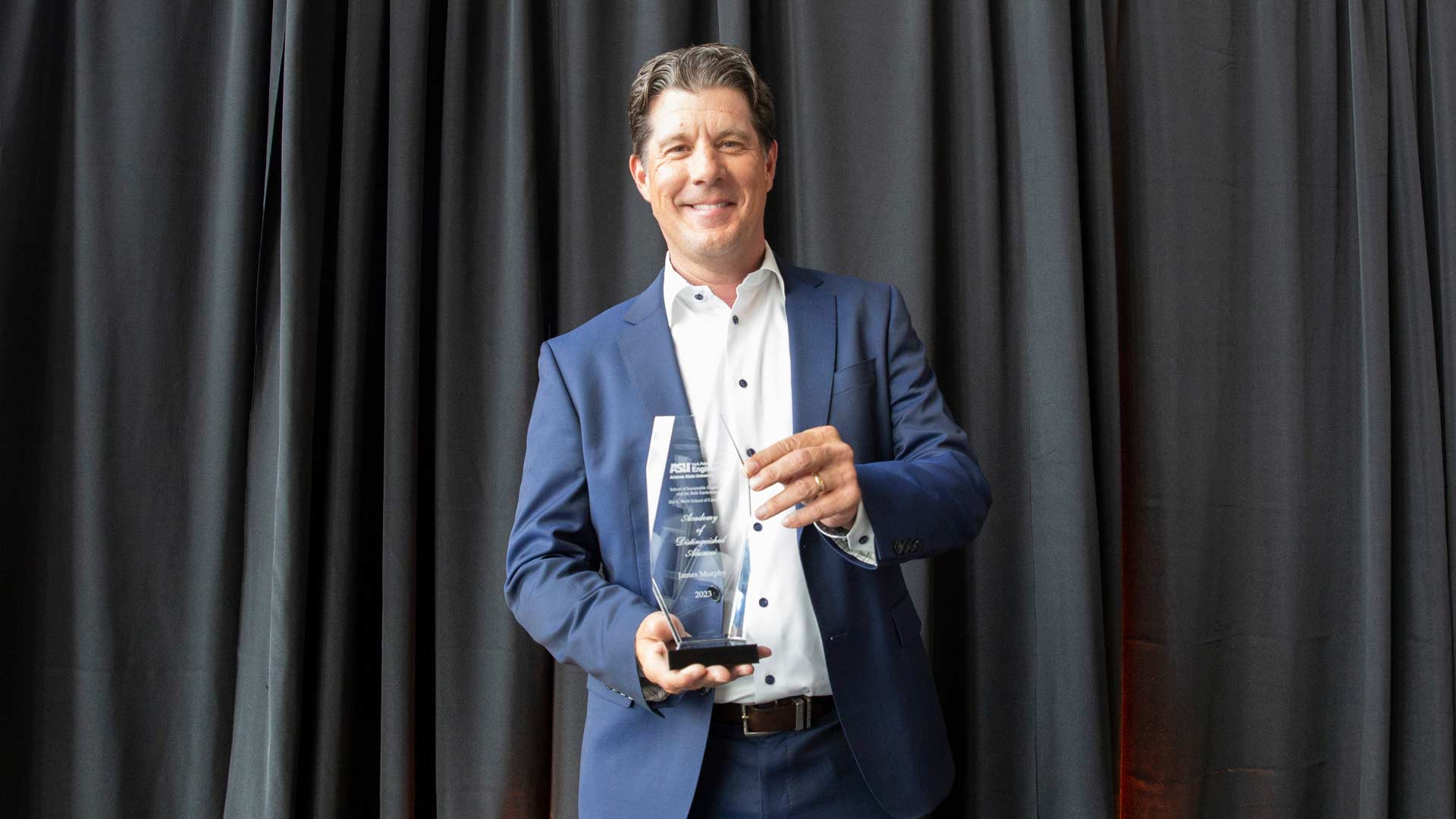Shining a spotlight on engineering leaders, creators, innovators
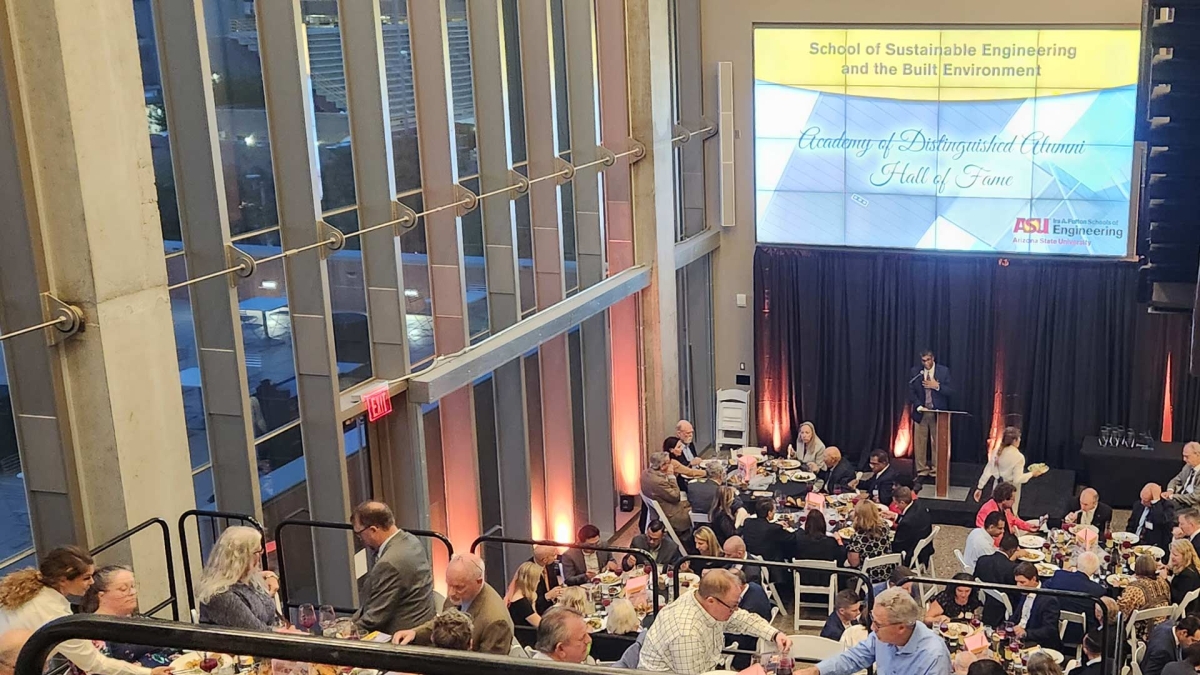
New Hall of Fame and Academy of Distinguished Alumni of the School of Sustainable Engineering and the Built Environment were honored at a recent event. Photo by Matthew Eicher/ASU
More than just outstanding professional skills, expertise and career success are considered when assessing candidates for induction into the Hall of Fame and Academy of Distinguished Alumni of the School of Sustainable Engineering and the Built Environment, part of the Ira A. Fulton Schools of Engineering at Arizona State University.
Those selected for the honors are also evaluated for how they have excelled at serving their communities in ways that reflect the public service values and New American University aspirations of the Fulton Schools and ASU.
A recent ceremony celebrated the achievements of two new Hall of Fame inductees and five new Academy of Distinguished Alumni inductees whose work in engineering and construction fields exemplifies those qualities.
Professor Emeritus George Edward “Edd” Gibson Jr. and Professor Emeritus Sandra Houston are new members of the Hall of Fame. Edward Bouwer, inducted posthumously, Chidambaram Gnanasambanthan, Mark Kramer, James Murphy and Paul Von Berg were elected to the Academy of Distinguished Alumni.
Former professor oversaw school’s rapid growth
Gibson came to ASU in 2009 to become chair of the Del E. Webb School of Construction within the School of Sustainable Engineering and the Built Environment. He then served as the latter school’s director from 2010 to 2018.
Gibson led major fundraising efforts and was instrumental in the construction of a new building that serves as the school’s headquarters. He led the school during a decade of rapid enrollment growth and the expansion of faculty research pursuits.
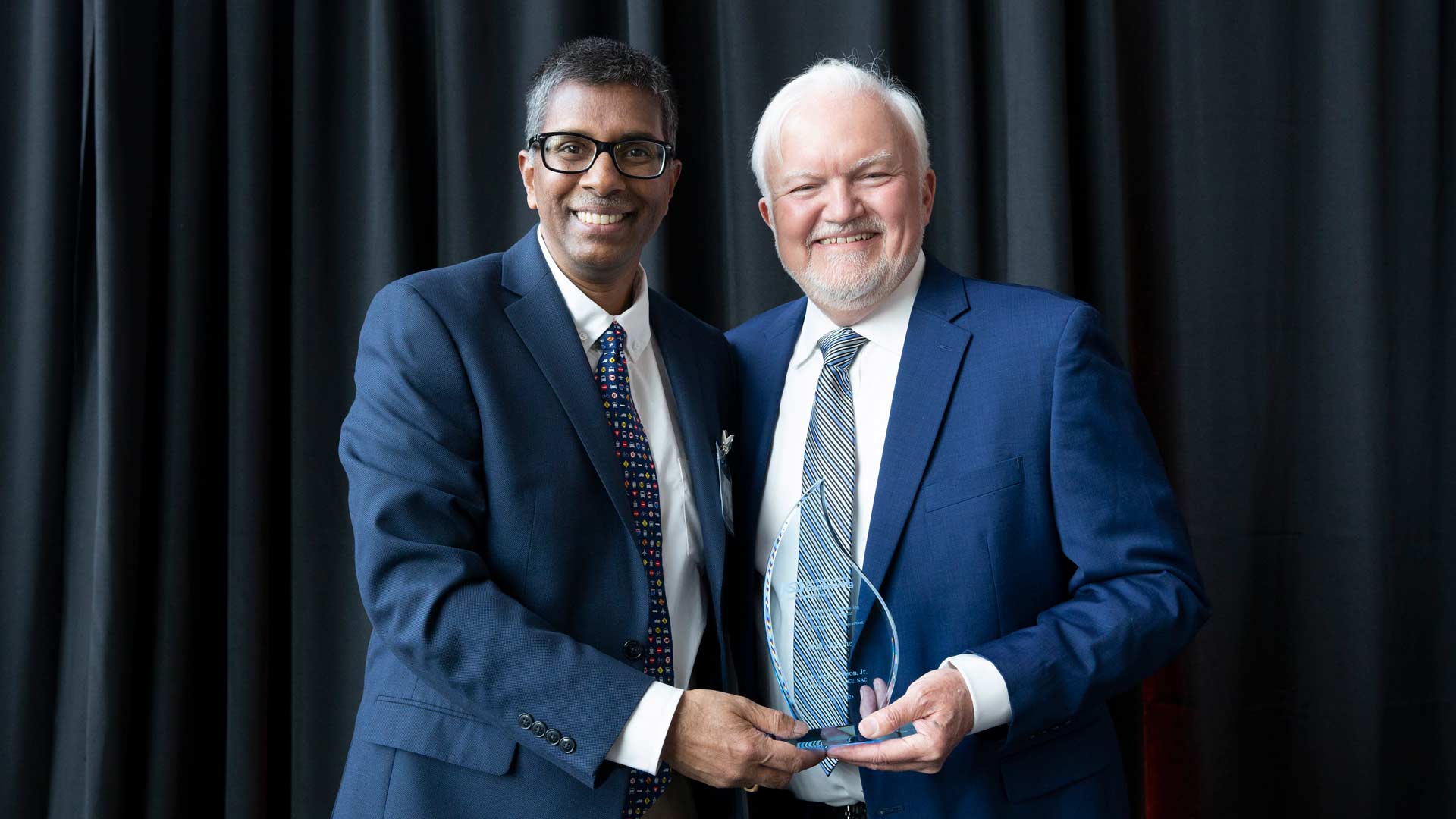
Professor Ram Pendyala (left), director of the School of Sustainable Engineering and the Built Environment, poses with Professor Emeritus George Edward “Edd” Gibson Jr. after Gibson was inducted into the school’s Hall of Fame. Gibson oversaw the growth of the school for almost a decade as its first director. Photo by Erika Gronek/ASU
During his career, Gibson was elected to the National Academy of Construction, or NAC, received the Peurifoy Award for Outstanding Research from the American Society of Civil Engineers, or ASCE, and later won the Construction Industry Institute’s Richard L. Tucker Leadership and Service Award. In 2020, Gibson was elected a Distinguished Member of ASCE.
Earlier this year, he departed ASU to become the NAC’s president and CEO.
“Edd Gibson’s decades of contributions to research, teaching, service and leadership make him a standout among members of the school’s Hall of Fame,” says Samuel Ariaratnam, a Fulton Schools professor of civil and construction engineering and Gibson’s longtime colleague.
Former civil and environmental engineering chair sows seeds for soil research
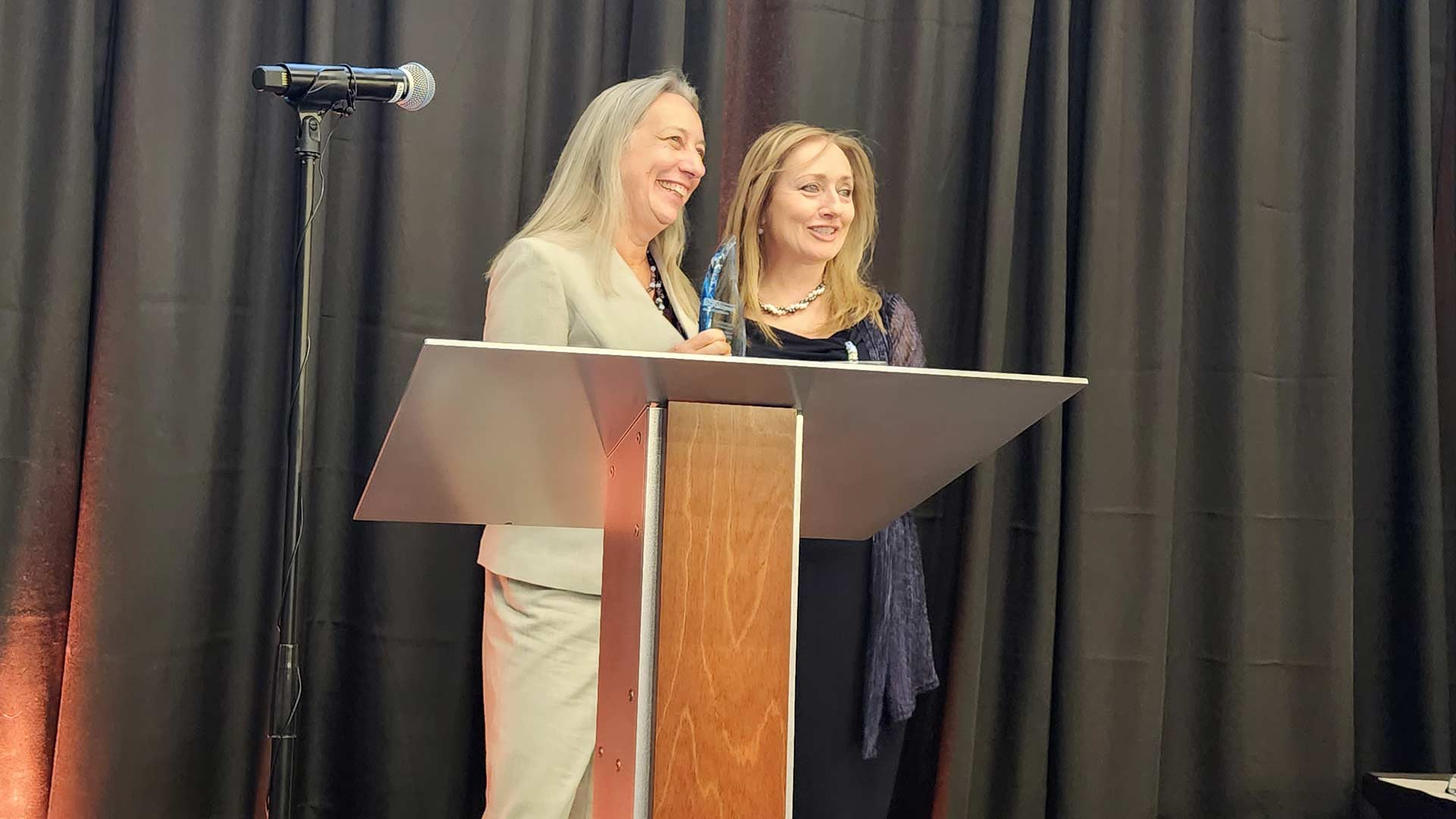
Professor Emeritus Sandra Houston (left) was presented a commemorative statuette during her recent induction into the School of Sustainable Engineering and the Built Environment Hall of Fame. She is pictured with Claudia Zapata, an associate professor of civil engineering in the school, who noted Houston’s contributions as an educator, researcher and student mentor. Photo by Erika Gronek/ASU
Houston served for a decade as chair of the school’s civil and environmental engineering program, overseeing a period of its substantial expansion. During the 36 years she taught and conducted research in geotechnical engineering, she earned major awards for her expertise in unsaturated soil mechanics and related research.
Houston also served as president of the ASCE Geo-Institute. In that role, she was instrumental in supporting the work of many who became contributors to impactful geotechnical research.
“She attracted stars to the field,” says Claudia Zapata, a Fulton Schools associate professor of civil engineering and Houston’s colleague. “But just as important, she was determined in her mission to bring more women into ASU’s engineering faculty. Her work was part of much-needed efforts to advance equity and inclusion in the profession.”
Houston remains active in the civil engineering field since her retirement. Zapata noted that Houston continues to mentor women faculty members and support efforts of the National Science Foundation to increase the participation of women, minorities and people with disabilities in STEM fields.
Career marked by leadership, loyalty and integrity
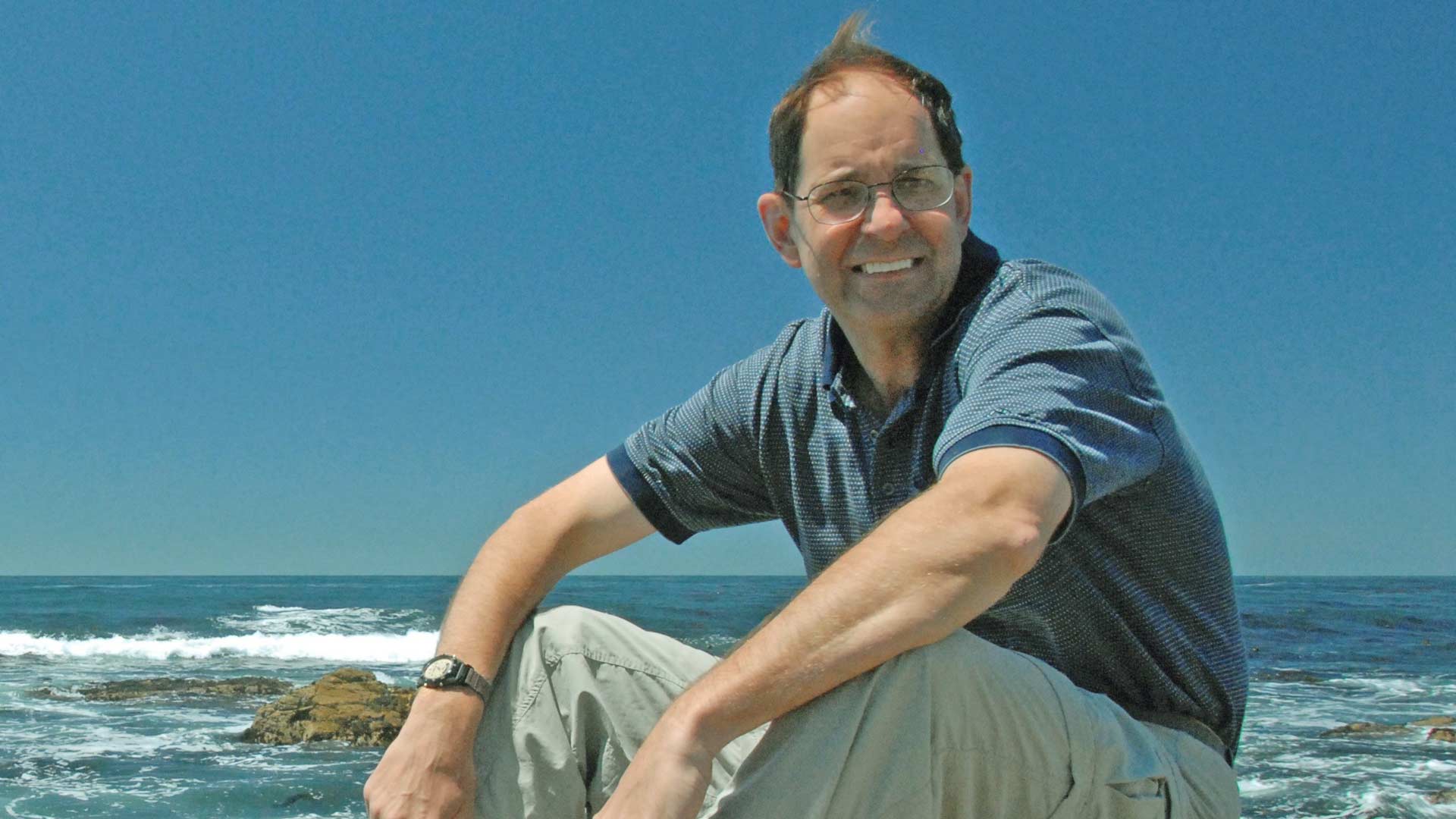
The late Edward Bouwer, a new Academy of Distinguished Alumni inductee, was an internationally prominent leader in environmental microbiology and biotechnology, known particularly for making advances in the bioremediation of contaminated groundwater. Photo courtesy the Bouwer family
Bouwer, who earned an undergraduate degree in civil engineering at ASU in 1977, became an internationally recognized leader in environmental microbiology and biotechnology. He served on the faculty of Johns Hopkins University’s Whiting School of Engineering for more than 34 years.
Early in his career, Bouwer won an achievement award for his environmental engineering doctoral dissertation, which helped to pioneer work in demonstrating how anaerobic bacteria could remove chlorine from hazardous chlorinated solvents, rendering them harmless. The discovery was pivotal in advancing the field of modern contaminated groundwater bioremediation.
Bouwer later served as chair of the Department of Environmental Health and Engineering at Johns Hopkins for nine years, a period during which the department’s graduate and undergraduate environmental engineering programs were ranked among the top 10 in the nation.
“Edward Bouwer was a leader in all aspects of environmental engineering — in research, education and service to the profession,” says Fulton Schools Regents Professor Bruce Rittmann, director of ASU’s Biodesign Institute Swette Center for Envionmental Biotechnology, who first met Bouwer when they were doctoral students at Stanford University.
“Ed was also famous for his integrity and loyalty to his students, his colleagues and to ASU,” Rittmann says.
Exemplary entrepreneur, visionary, advocate
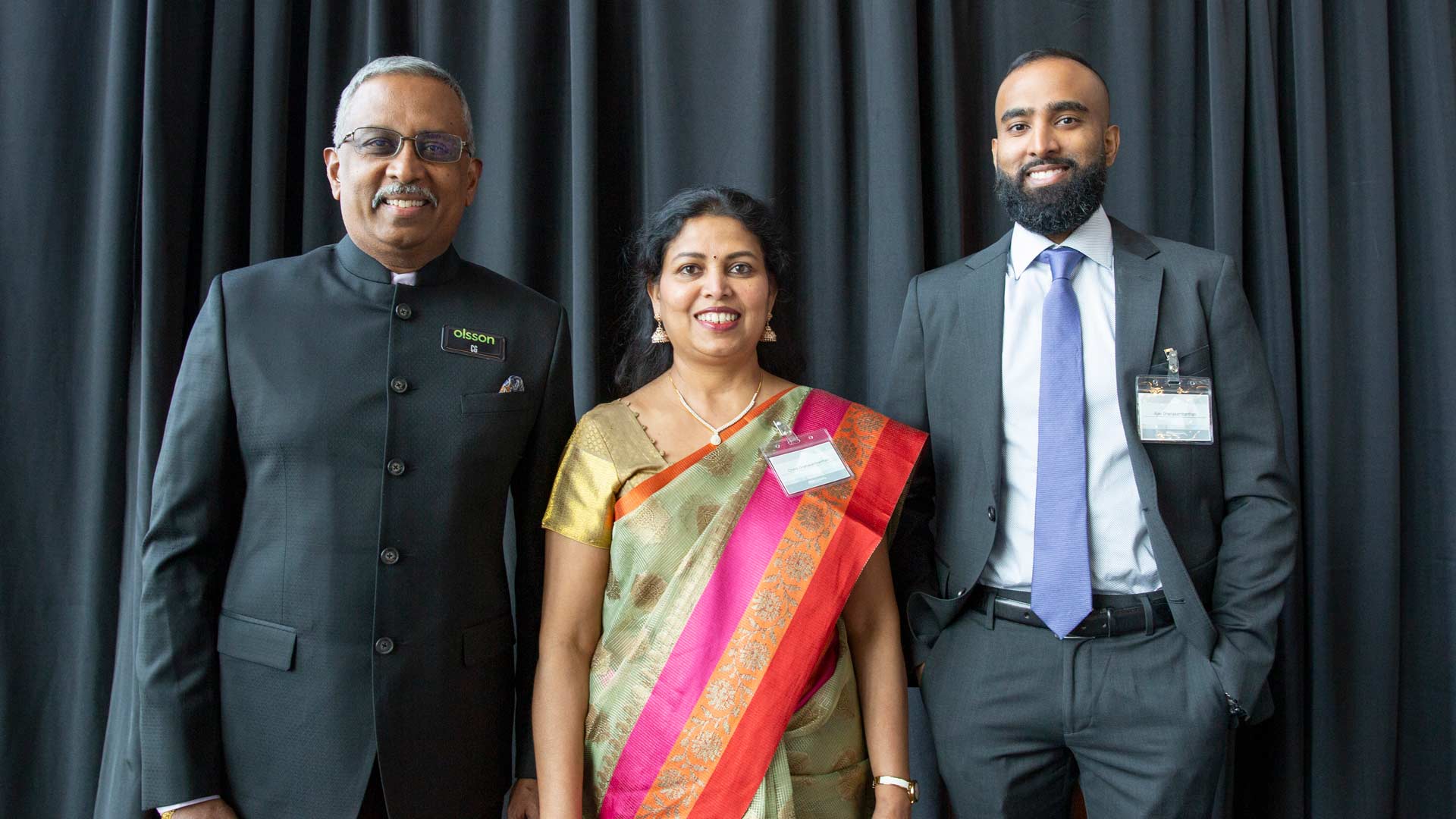
Academy of Distinguished Alumni inductee Chidambaram Gnanasambanthan (left) has 40 years of experience in civil engineering, structural engineering, project management and entrepreneurship. He was on the board of the American Council of Engineering Companies of Arizona for more than 11 years. He is pictured with wife Chitra Gnanasambanthan and son Ajay Gnanasambanthan. Photo by Erika Gronek/ASU
Gnanasambanthan graduated from ASU in 1986 with a master’s degree in structural engineering and then specialized in bridge design for more than a decade before starting his own company, Premier Engineering Corporation.
The business grew into a multidisciplinary enterprise with capabilities to provide civil, structural, geotechnical and transportation engineering, drainage engineering design and land survey services. Premier Engineering became a founding member of the Fulton Schools’ Friends of Civil and Environmental Engineering.
In 2021, the company was acquired by the engineering and design firm Olsson, where Gnanasambanthan now serves as an associate vice president. The company’s leaders encouraged his continued partnership with ASU faculty and students, especially those in the Fulton Schools.
Gnanasambanthan has been active in several professional organizations, including the American Council of Engineering Companies of Arizona, or ACEC Arizona, and the Society of American Military Engineers. He has served in multiple leadership roles at ACEC of Arizona over more than 14 years, acting as a liaison between the consulting industry and public agencies in Arizona.
“He strongly believes employees form the backbone of any company,” says Subramaniam Rajan, a Fulton Schools professor of civil engineering. “When asked about his company, he replies that Premier Engineering Corporation was created as part of his vision for providing workplaces in which employees can flourish in a family-like environment and provide quality products to the clients.”
Hard work, business acumen brought success
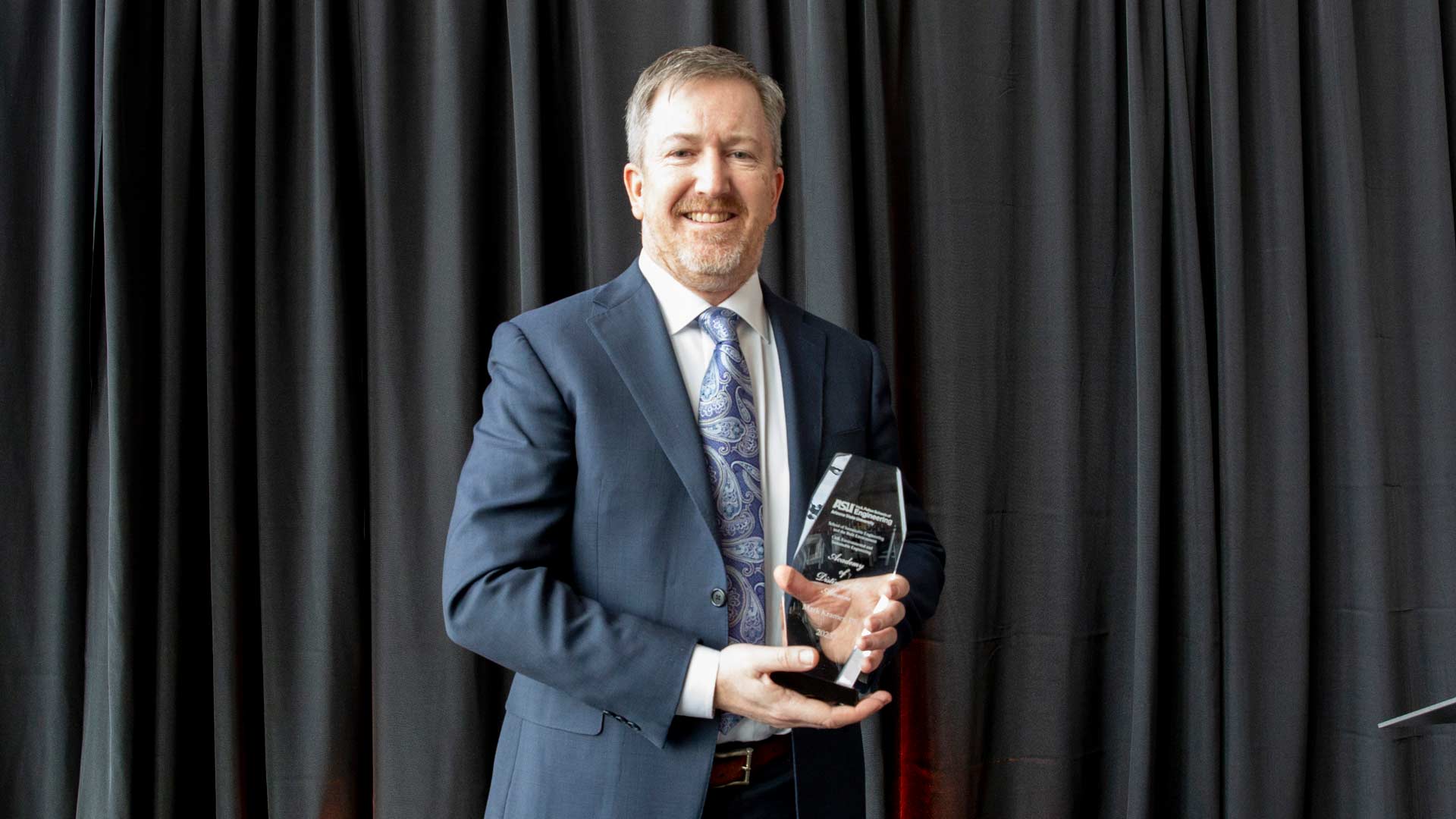
Mark Kramer, a new member of the Academy of Distinguished Alumni, leads the employee-owned company Soil and Materials Engineers. It is among the top engineering design firms in the U.S. He has held leadership roles in the American Council of Engineering Companies of Michigan, including serving on its board of directors. Photo by Erika Gronek/ASU
Kramer earned a bachelor’s degree in civil engineering degree at ASU and also graduated from the Harvard Business School Owner/President Management program. Today, he is chairman of the board and CEO of Soil and Materials Engineers, or SME, a leading civil engineering and environmental services consulting firm headquartered in Michigan.
The company works for clients such as Ford Motors and General Motors and other corporate and institutional clients, state and federal agencies, corporate and institutional clients, universities and hospital systems, real-estate investment trusts and private developers, and power and transmission companies.
Kramer is the controlling owner and second-generation leader of the employee-owned company. He is also the president and chairman of the board for a real-estate holding and development company and director of an insurance company that serves engineering and environmental consulting firms.
Since 2002, Kramer has led SME as CEO and grown the company to more than 380 professional and technical staff. The firm has continually been ranked among the top 500 design firms in the U.S. by the Engineering News Record and is currently ranked at No. 289 in the country.
“Mark readily admits he wasn’t at the top of the class while he was a civil engineering student at ASU," says Matthew Fraser, a Fulton School’s professor of chemical and environmental engineering. “However, he used the knowledge he gained here — with hard work and determination, built his company into a regional powerhouse providing civil engineering consulting for a wide range of clients and applications.”
Committed to company and community
James Murphy, a new Academy of Distinguished Alumni member, joined the Willmeng Construction company in 1999 as a young college graduate. Less than a decade later, he became the company’s president. Murphy is now CEO, overseeing a company of more than 350 employees. Photographer: Erika Gronek/ASU
Murphy graduated from the Del E. Webb School of Construction in 1998 with a degree in construction management. Soon after, he began an internship with the Willmeng Construction company, which hired him the following year.
Murphy worked in multiple roles for Willmeng, learning about both the technical and business aspects of the company’s operations. After only seven years, he bought the company and became its president and CEO. He went on to build a client base as a strategic partner in building projects.
Murphy now leads Willmeng, one of Arizona’s largest privately held construction companies, overseeing more than 350 employees and nearly $1 billion in revenue through a variety of market types far beyond the industrial market sector the company was founded upon. The company is recognized for its culture, strategy and industry relationships, winning more than 22 awards in 2022.
Murphy attributes much of his success to his education in the Del E. Webb School of Construction, particularly the faculty members who mentored and advised him, including Professor Emeritus William Badger, Professor Emeritus Dean Kashiwagi and Avi Wiezel, a Fulton Schools associate professor of construction engineering.
Building on those roots, Murphy developed a course on field leadership in construction that he now teaches to undergraduate and graduate students as an ASU faculty associate.
“James is a nationally recognized construction industry leader who embodies the knowledge we try to impart to our students,” says Kristen Parrish, a Fulton Schools professor of construction management and civil and environmental engineering. “He is a visionary who focuses on delivering value to and for people. He upholds the highest ethical standards and is committed to giving back to the community.”
Decades of accomplishment in construction
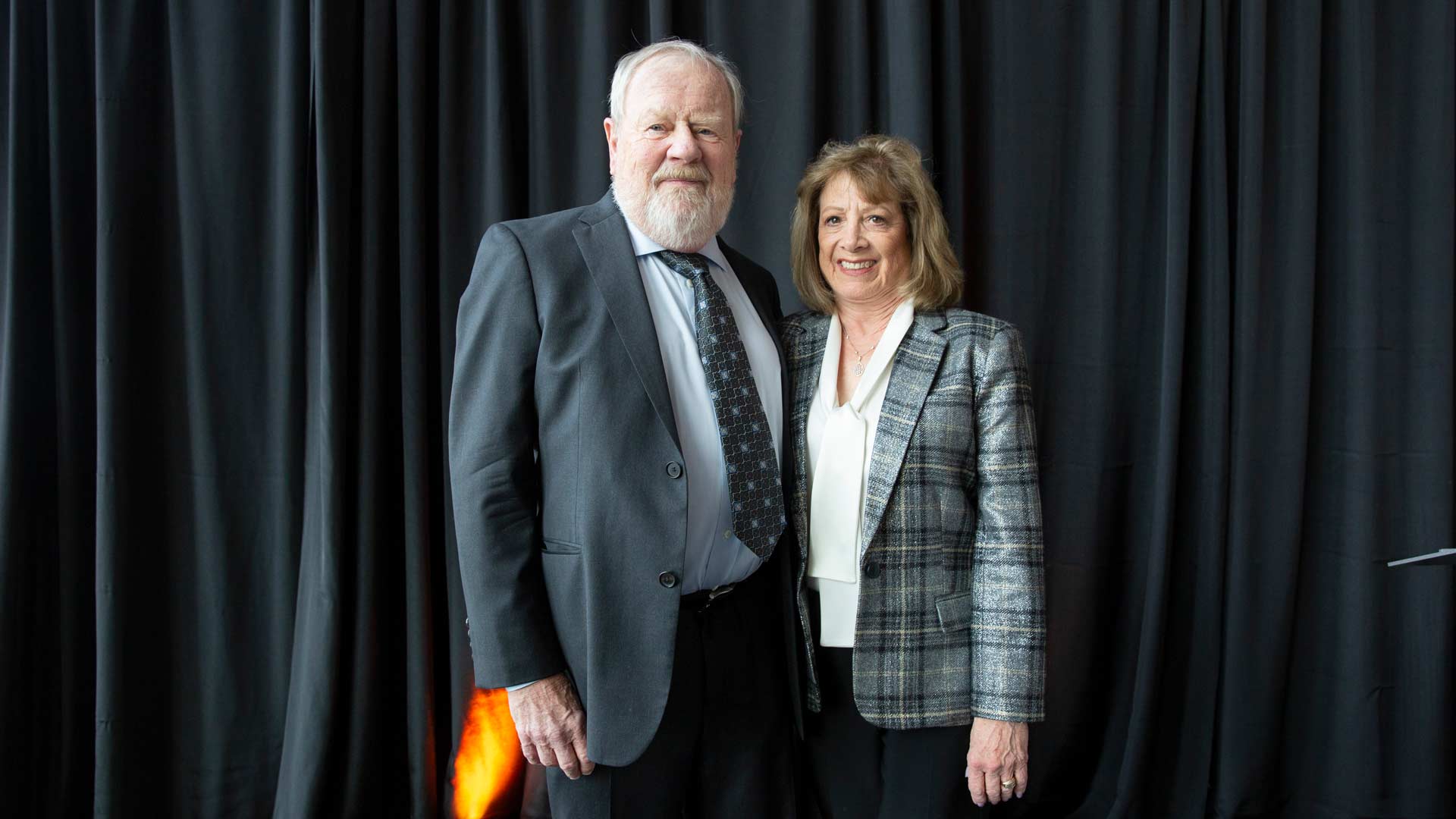
Academy of Distinguished Alumni inductee Paul Von Berg worked on a wide range of projects in the construction industry throughout more than four decades. He was also on the board of directors of the national American Road and Transportation Builders Association. Photo by Erika Gronek/ASU
Von Berg is a retired executive vice president of Brutoco Engineering & Construction, which before closing specialized in heavy civil construction projects. He has more than 40 years of experience in the industry and worked on various projects, including water treatment plants, bridges, railroads, dams, tunnels, power plants and transit systems. He also served on the board of directors of the American Road and Transportation Builders Association, a national transportation trade association.
“Paul built many notable infrastructure projects in 13 western U.S. states, including the the Eisenhower–Edwin C. Johnson Memorial Tunnel carrying Interstate 70 through the Rocky Mountains and the third power plant at the Grand Coulee Dam in Washington,” says James Ernzen, a Fulton Schools associate professor of civil engineering and construction management and engineering. “He was always guided by a willingness to give back to his industry, especially through recruiting young people into construction and mentoring them.”
Generous alumni enrich school in many ways
“All of our new Hall of Fame members are outstanding mentors and leaders who have generously given their time and talent over a sustained period of time for the benefit of our students and the school’s many stakeholders,” says Professor Ram Pendyala, director of the School of Sustainable Engineering and the Built Environment.
“The new Academy of Distinguished Alumni members are ASU Sun Devils who have excelled in their chosen fields and are ideal role models who have risen to the pinnacle of their profession,” Pendyala says. “But what sets all the inductees apart is their commitment to service and to advancing the profession, the next generation workforce and their communities. We’re proud to etch the names of this year’s inductees into the annals of exemplary difference makers who have enriched our school.”
Nominations for induction into the Hall of Fame and Academy of Distinguished Alumni come from faculty members and alumni.
“The nominators are the professional peers and faculty members who understand the commitment to excellence it takes to do what the inductees have accomplished,” says Matthew Eicher, the school’s assistant director for student success and industry outreach. “Beyond their own achievements, a number of the inductees have also made an impact through significant philanthropic contributions that create opportunities for the growth of our school, improve our educational programs and open new pathways for academia and industry partners to engage in new and meaningful ways.”
More Science and technology

ASU professor breeds new tomato variety, the 'Desert Dew'
In an era defined by climate volatility and resource scarcity, researchers are developing crops that can survive — and thrive —…

Science meets play: ASU researcher makes developmental science hands-on for families
On a Friday morning at the Edna Vihel Arts Center in Tempe, toddlers dip paint brushes into bright colors, decorating paper…

ASU water polo player defends the goal — and our data
Marie Rudasics is the last line of defense.Six players advance across the pool with a single objective in mind: making sure that…


